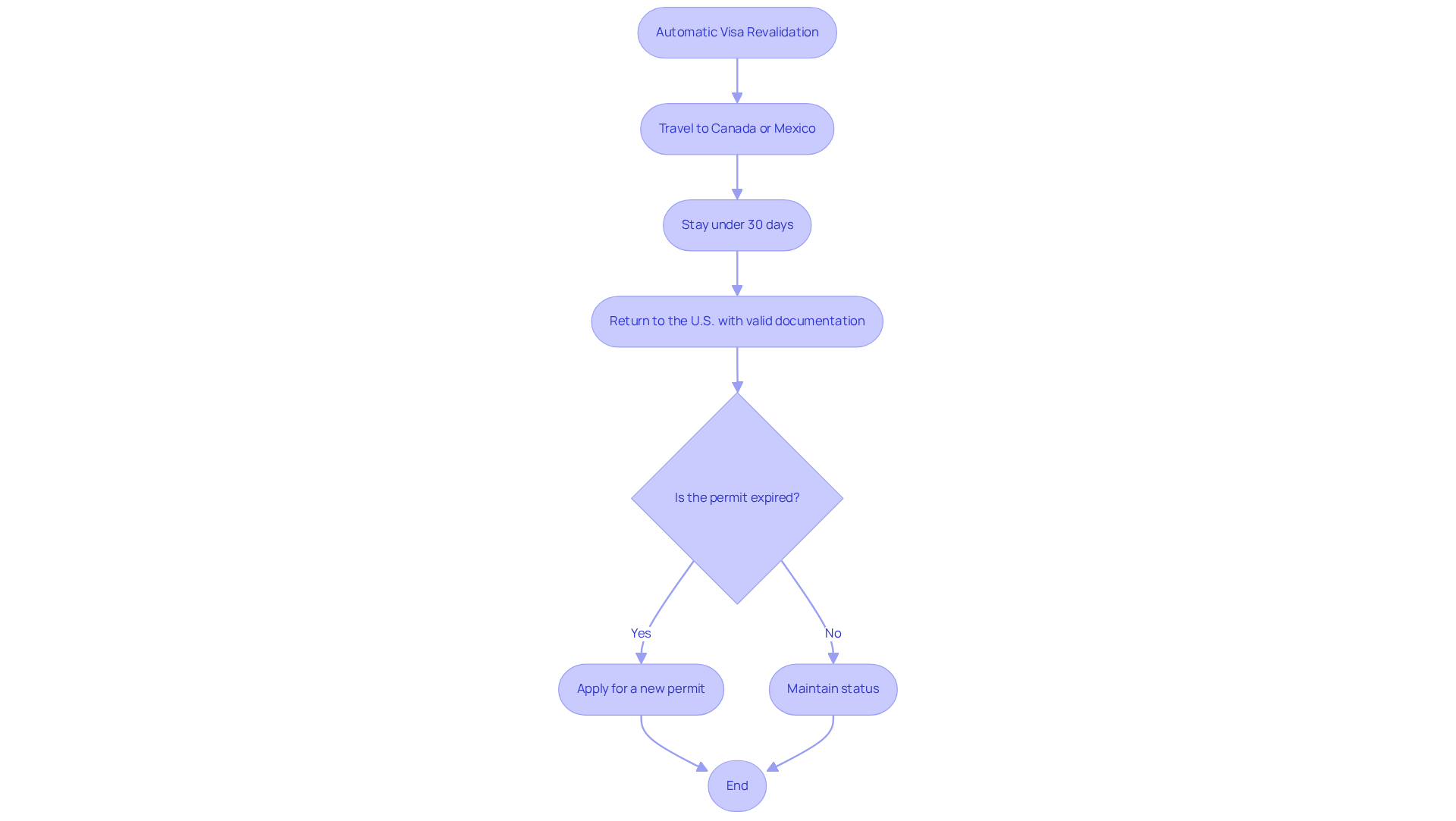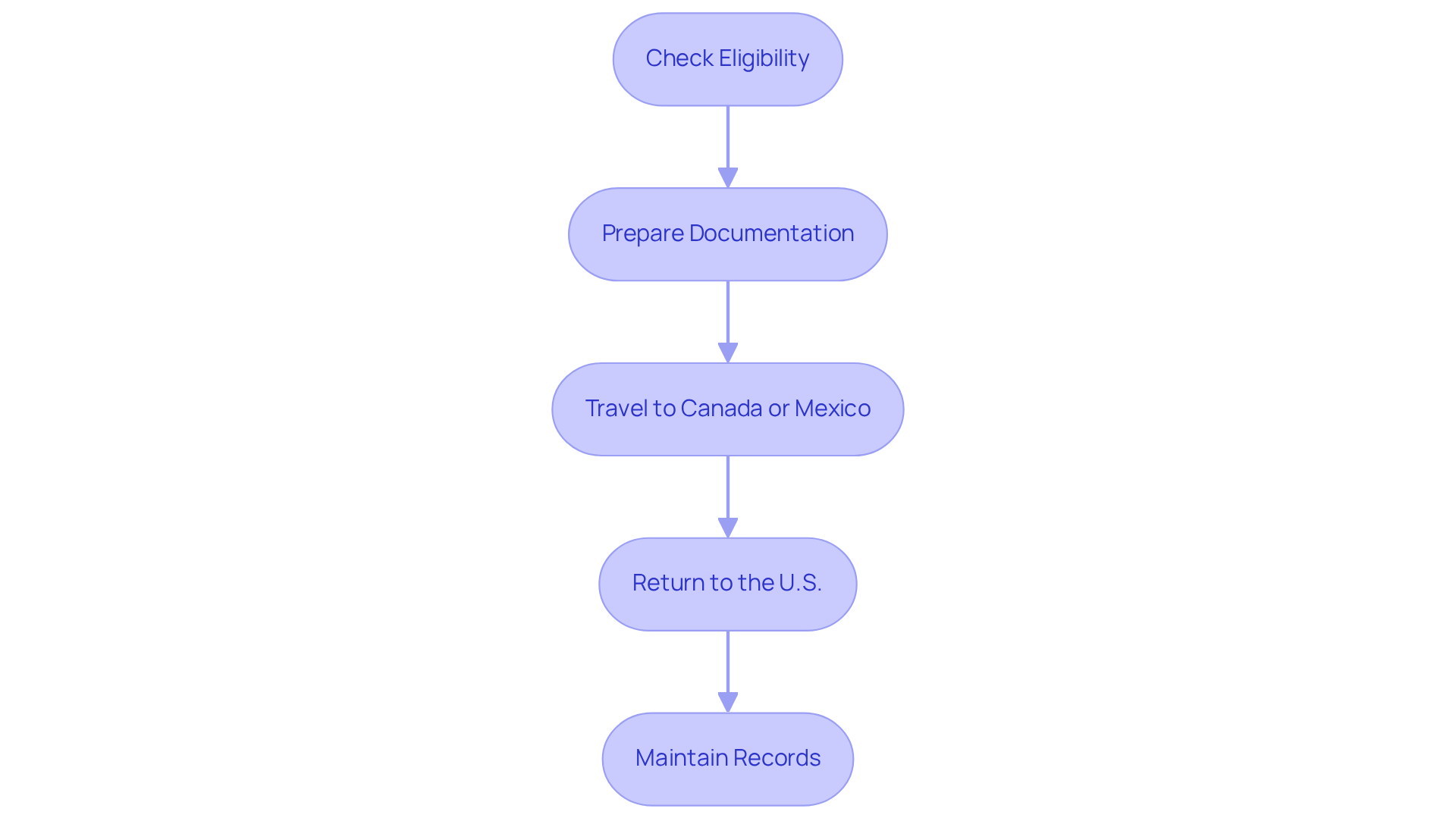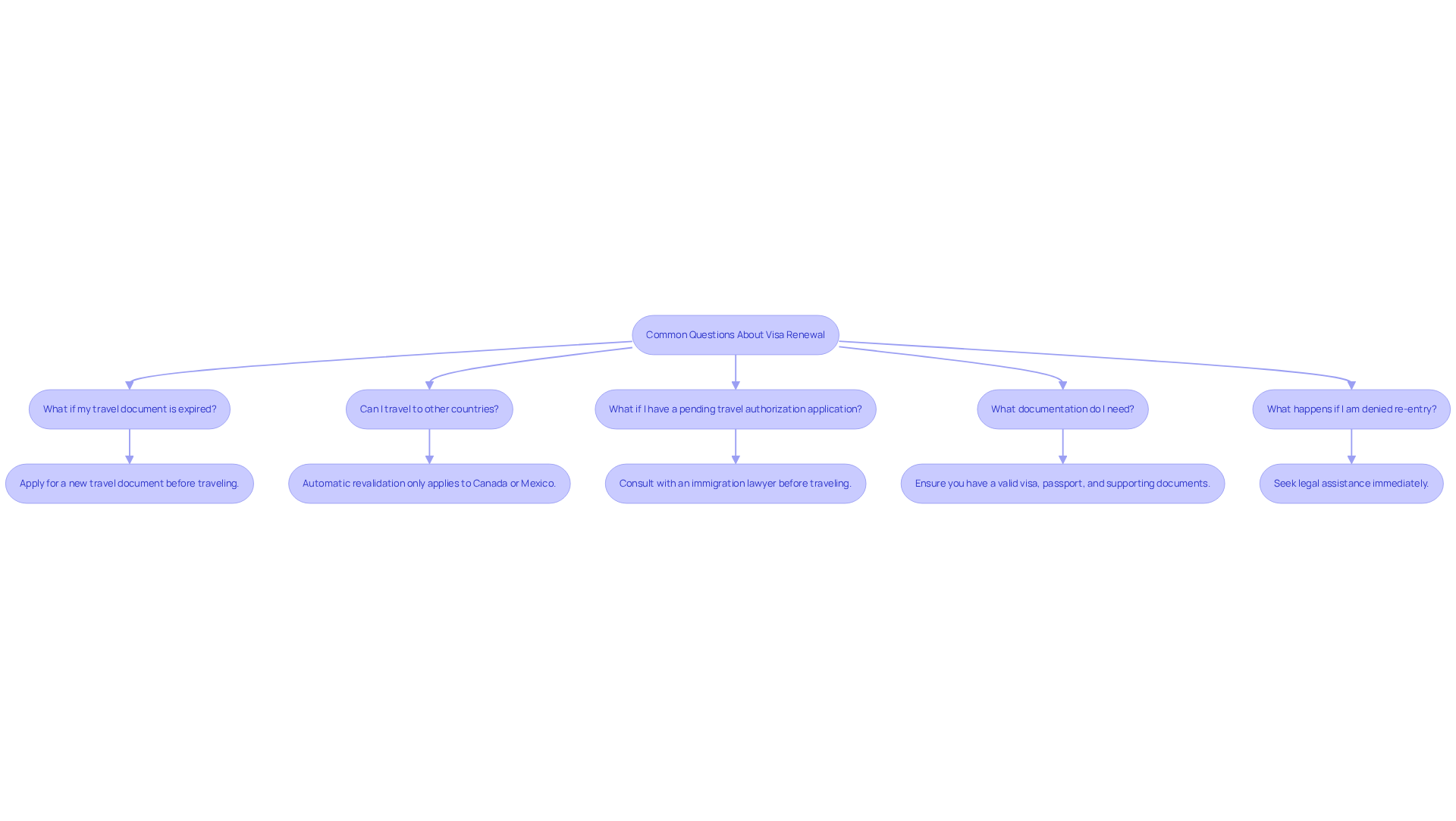Overview
This article outlines the essential steps that immigrant healthcare workers must take to master the automatic visa revalidation process. It underscores the significance of this process in maintaining immigration status, even during short trips outside the U.S. Proper documentation and strict adherence to eligibility criteria are crucial for ensuring a smooth re-entry.
Remember, navigating these complexities can feel overwhelming, but you’re not alone in this fight. We’re here to support you every step of the way.
Introduction
Navigating the intricate web of immigration regulations can be particularly challenging for immigrant healthcare workers. Maintaining legal status while fulfilling professional obligations is no small feat. The automatic visa revalidation process offers a crucial opportunity for these individuals to travel abroad for short periods without the fear of jeopardizing their immigration status or employment. But the complexities of eligibility criteria and procedural requirements can leave many feeling lost.
How can healthcare professionals effectively leverage this provision to ensure seamless re-entry into the U.S.? This article delves into essential steps and considerations for mastering automatic visa revalidation, empowering immigrant medical workers to navigate their journeys with confidence.
Define Automatic Visa Revalidation and Its Importance
Navigating the complexities of immigration can be daunting, especially for nonimmigrant permit holders like F-1 and M-1 students. The process of entry renewal stands as a crucial lifeline, allowing these individuals to re-enter the United States after short trips to Canada or Mexico for under 30 days without the need for a new permit. This is particularly vital for immigrant medical professionals who face unique challenges tied to their immigration status and employment. By utilizing the automatic revalidation visa, they can address personal emergencies or professional commitments abroad without risking their legal status or job security.
Returning to the U.S. on an expired permit helps maintain stability in their immigration status, which is essential for their careers and personal lives. For example, medical workers can sidestep the lengthy and uncertain process of applying for a new visa, which can disrupt their employment. This is especially significant in a field where job security is paramount, given the ongoing demand for medical services driven by an aging population and increasing health needs.
Moreover, the automatic revalidation visa bolsters employment stability for medical professionals, enabling them to remain in the workforce without interruption. As the medical field evolves, with projections indicating a steady demand for roles like nurse practitioners and physician assistants, the ability to travel without jeopardizing immigration status becomes even more critical. Experts emphasize that maintaining a stable workforce is vital for addressing the rising medical demands, particularly in underserved areas.
However, it’s crucial to recognize that individuals seeking a new permit while outside the U.S. cannot return until their new permit is issued. This highlights the importance of understanding the limitations of this provision. Additionally, nearly 80% of medical and social support workers are female, underscoring the demographic significantly impacted by these visa regulations.
To successfully re-enter the U.S. under Visa Renewal, medical professionals must possess the appropriate documentation, including a valid Form I-20 and Form I-94. Furthermore, only F and J nonimmigrants can utilize the automatic revalidation visa when visiting nearby islands, which is an important consideration for those planning travel. Medical professionals on Optional Practical Training (OPT) should also be aware that exceeding unemployment limits while outside the U.S. may affect their eligibility to return.
In summary, understanding and effectively utilizing Visa Renewal is essential for immigrant medical professionals. It ensures they can fulfill their professional responsibilities while safeguarding their immigration status and job security. We’re here to fight for your family, and to us.

Identify Eligibility Criteria for Automatic Revalidation
To qualify for Automatic Visa Revalidation, immigrant healthcare workers must meet specific criteria:
- Valid Nonimmigrant Permit: You need a valid nonimmigrant permit that hasn’t expired. Common eligible categories include F, J, H, L, O, and P types.
- Travel Duration: Your trip to Canada or Mexico must not exceed 30 days.
- No Change of Status: It’s crucial that you haven’t applied for a change of status or extension of stay while in the U.S.
- No Visa Denial: You must not have been denied a visa application during your absence.
- Maintained Status: Throughout your stay in the U.S., you must have maintained your nonimmigrant status.
Understanding these is essential for medical workers, as they ensure safe travel without jeopardizing your immigration status and support the automatic revalidation visa. A significant number of immigrant healthcare professionals meet these requirements, allowing them to effectively utilize the automatic revalidation visa. For example, F-1 students and their F-2 dependents can travel under these provisions, showcasing the practical application of these guidelines in real-life scenarios.
Additionally, it’s vital to check your I-94 Arrival Record for accuracy, including the Class of Admission and Admit Until Date, to ensure compliance with revalidation requirements. Remember, adhering to these requirements is crucial for a seamless re-entry into the U.S. You’re not alone in this process; we’re here to fight for your family and support you every step of the way.

Outline Procedures for Utilizing Automatic Visa Revalidation
To effectively utilize the automatic revalidation visa, follow these essential steps:
- Check Eligibility: Ensure you meet the eligibility criteria, including holding a valid, unexpired I-94 record. Remember, the automatic revalidation visa is not available to nationals from countries designated as state sponsors of terrorism.
- Prepare Documentation: Gather your vital documents, such as a valid passport (which must be valid for at least six months beyond your re-entry date), travel authorization, and any supporting materials confirming your nonimmigrant status, like an I-20 or DS-2019.
- Travel to Canada or Mexico: Plan your trip carefully, ensuring it lasts no longer than 30 days to qualify for revalidation. If you have been outside the U.S. for over thirty days, you must reapply for permission to reenter.
- Return to the U.S.: Upon re-entry, present your passport and immigration document to the Customs and Border Protection (CBP) officer, clearly stating that you are using the .
- Maintain Records: Keep copies of all travel documents and any correspondence regarding your immigration status for future reference.
Following these steps will facilitate a seamless re-entry into the U.S. through the automatic revalidation visa, avoiding any complications. Immigration attorneys emphasize the importance of having a valid passport, an I-94 form, and any visa-specific documents ready to avoid delays. Successful examples include individuals who traveled briefly to Canada or Mexico and returned without issues, thanks to proper documentation and adherence to the guidelines. Furthermore, using automatic re-assessment can save nonimmigrants both time and money by avoiding expensive application fees.

Address Common Questions and Concerns About Automatic Revalidation
Here are some common questions and concerns regarding Visa Renewal:
- What if my travel document is expired?
If your travel document has expired, you cannot use automatic renewal. You must apply for a new travel document before traveling. - Can I travel to other countries?
Automatic revalidation visa only applies to travel to Canada or Mexico. Traveling to other countries may require a new permit. - What if I have a pending travel authorization application?
If you have a pending travel document application, consult with an immigration lawyer before traveling. This may impact your eligibility for revalidation. - What documentation do I need?
Ensure you have your valid visa, passport, and any supporting documents that prove your nonimmigrant status. - What happens if I am denied re-entry?
If you are denied re-entry, seek legal assistance immediately to address the situation.
Understanding these common concerns can help immigrant healthcare workers navigate the with greater confidence. Remember, you’re not alone in this fight—we’re here to support you every step of the way.

Conclusion
Navigating the complexities of automatic visa revalidation is essential for immigrant healthcare workers who wish to maintain their professional responsibilities while safeguarding their immigration status. This streamlined process allows eligible individuals to travel briefly to Canada or Mexico without the burden of applying for a new visa, ensuring continuity in their careers and personal lives.
The critical steps and eligibility criteria necessary for utilizing the automatic revalidation visa are vital to understand. It’s important to:
- Maintain a valid nonimmigrant permit
- Grasp the limitations of travel duration
- Prepare the appropriate documentation to ensure a smooth re-entry into the U.S.
By adhering to these guidelines, healthcare professionals can confidently manage their immigration status while fulfilling their vital roles in the medical field.
The significance of automatic visa revalidation cannot be overstated, particularly for those in the healthcare sector. It facilitates necessary travel and reinforces the stability of the workforce crucial for addressing growing healthcare demands. Immigrant healthcare workers are encouraged to leverage this process to support their careers and personal commitments while remaining informed and prepared for any potential challenges that may arise. Remember, we’re here to fight for your family and your future matters to us.
Frequently Asked Questions
What is automatic visa revalidation?
Automatic visa revalidation allows nonimmigrant permit holders, such as F-1 and M-1 students, to re-enter the United States after short trips to Canada or Mexico for under 30 days without needing a new visa permit.
Why is automatic visa revalidation important for immigrant medical professionals?
It is crucial for immigrant medical professionals as it enables them to address personal emergencies or professional commitments abroad without risking their legal status or job security, thus maintaining stability in their immigration status.
How does automatic visa revalidation help maintain employment stability?
By allowing medical professionals to return to the U.S. on an expired permit, it helps them avoid the lengthy process of applying for a new visa, ensuring they can remain in the workforce without interruption, which is vital given the ongoing demand for medical services.
Who can utilize the automatic revalidation visa?
Only F and J nonimmigrants can utilize the automatic revalidation visa, and it is applicable when visiting nearby islands.
What documentation is required for medical professionals to re-enter the U.S. under visa renewal?
Medical professionals must possess a valid Form I-20 and Form I-94 to successfully re-enter the U.S. under visa renewal.
What should medical professionals on Optional Practical Training (OPT) be aware of when traveling?
Medical professionals on OPT should be cautious about exceeding unemployment limits while outside the U.S., as it may affect their eligibility to return.
What are the limitations of automatic visa revalidation?
Individuals seeking a new permit while outside the U.S. cannot return until their new permit is issued, highlighting the importance of understanding these limitations.
What demographic is significantly impacted by visa regulations in the medical field?
Nearly 80% of medical and social support workers are female, indicating that this demographic is significantly affected by the visa regulations.




